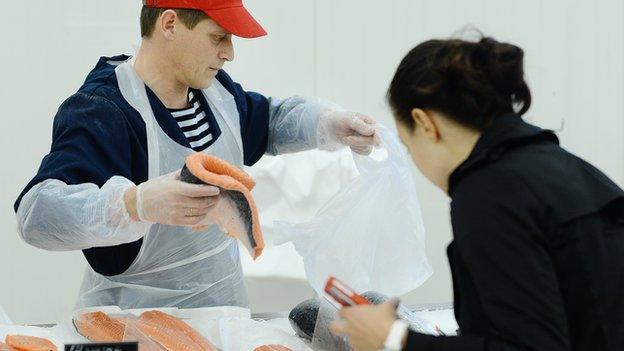Russia sanctions: Poland's apple growers feel the squeeze
- Published
BBC Business correspondent Nigel Cassidy reports from Poland
It's promising to be one of Poland's best apple harvests since records began. There has been plenty of rain and just the right amount of sunshine.
Yet Polish apple grower Barbara Domasiewicz and her family are unlikely to reap the rewards. That's because neighbouring Russia has always been the biggest single customer for the fruits produced on her family's farm.
Now the fate of much of her crop hangs in the balance.
Russia's ban on produce from the EU, in retaliation for sanctions over Ukraine is not without precedent. Imports from Poland were halted once before in 2008.
But this latest trade embargo has hit just a month before the annual harvest, and there is now a real chance that at least some of the crisp, juicy crop in these orchards, 55km (34 miles) south of the capital Warsaw, will just go to waste.
Crunch time
It's a hot, late summer day and Barbara is out in the orchards, walking the neat and fragrantly ripening rows with the marketing director of Ecogrupa, the nearby co-operative that distributes her apples. She tells him she has no illusions about how tricky it will be to find replacement customers willing to take large quantities of her crop.
"We are happy with the quality, but just don't know whether we can sell our apples or what price we can now get. The kind of apples we grow are good sellers in Russia but less popular in many other places in Europe."
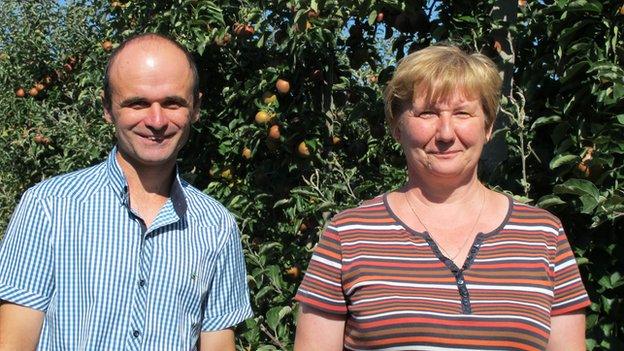
Apple grower Barbara Domasiewicz and her son fear some of their bumper crop may not find a buyer
Half of all Poland's apples are exported and last year half of that total went to bulk buyers in Russia for onward distribution to supermarkets and stores.
So the embargo puts a squeeze on Polish farmers that is hard to stomach.
Brussels puts the value of the country's entire fruit trade with Russia at over 339m euros (£271m).
Poland's vegetable sales there came in at about 173m euros (£138m). Poland was also a major, though not the largest, supplier of dairy and meat products.
New mindset
Most of the produce is sold through co-operative trading companies owned collectively by the growers.
The largest is Ecogrupa. It has previously sent up to 20 trucks a day across the Russian border, with each 21-tonne load containing some 80,000 apples.
Staff have already had plenty of enquiries from global customers looking to buy the now surplus crop, though only for rock-bottom prices.
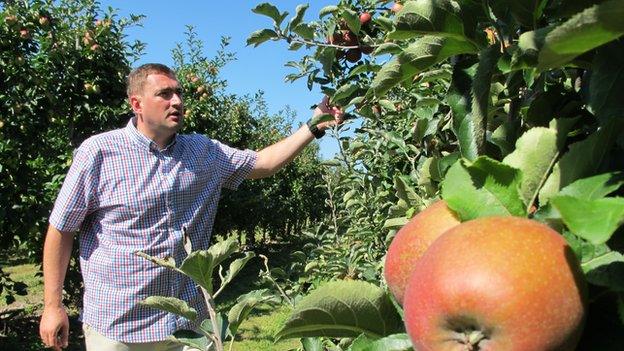
Distributor Pawel Zalewski says this is a wake-up call for Poland's apple industry
Ecogrupa's marketing director, Pawel Zalewski, has forged close relationships with his Russian buyers and emphasises he has no quarrel with them whatsoever.
He thinks the ban has already hit shoppers there hard - with typical fruit price rises of around 60%. He says he would not be surprised if Moscow looked for a face-saving way of reversing the ban before it officially expires in a year.
But he says the events of the last few weeks are also a wake-up call for the entire industry.
"Way before the embargo our group started to see that we should change our approach and move away from exporting apples by the crateload to buyers only looking for the lowest price.
"Margins in the industry are very low and we need to change the mindset of consumers. Polish apples are a great product which we can now treat very carefully and sell to new customers abroad."
'Better under pressure'
So Ecogrupa is encouraging Polish growers to rise above the loss of Russian bulk business by improving quality. Mr Zalewski proudly shows off a vast new processing warehouse built with the aid of EU funds.
The place is packed with industry-leading plant and robots to store, clean and grade apples by size and colour markings, even automatically probing the quality right though to the core without leaving a mark.
The best of the apples go into custom-designed and branded packaging, finding ready buyers in northern Europe, including Scandinavia and beyond.
Now the group is diversifying into turning even more of its growers' produce into "not from concentrate" apple juice and offering pre-peeled and cut fruit to caterers and restaurants.
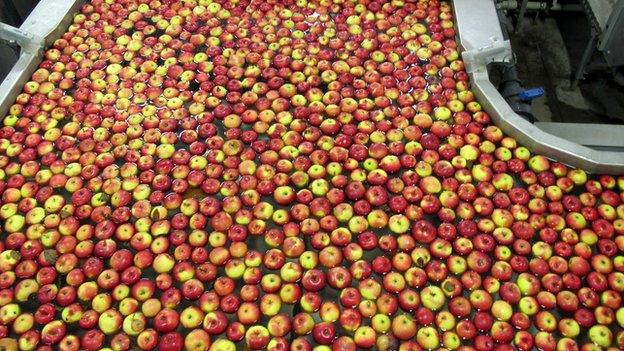
Hi-tech innovation in quality control, storage and processing could give the industry a boost
Adding value to the apple crop would also meet the approval of Malgorzata Starczewska-Krzysztoszek, chief economist of Lewiatana, the Polish Confederation of Private Employers. She is also on a prestigious economic board which advises the Polish prime minister.
"What's happened is a reminder that we need to change our agricultural model. We produce very good natural products and we must use technology to keep them in better condition, to improve packaging to prolong life without adding chemicals.
"There is a lot of room for innovation in Poland, but I think we can do it because we are always much better when we're under pressure."
Offering a taster
It may not be until December that the financial impact of the embargo on the apple trade becomes clear.
Most fruit famers were braced for this ban. But it is not yet clear how much they are willing or able to make the investments needed to replace the bulk trade with Russia with sales to Western fruit buyers who insist on named varieties of the highest quality.
When it comes to the EU-wide emergency relief for embargo-hit farmers, apple producers are far from first in the queue. Soft fruit and some vegetable growers have first call on a share of the 125m euro (£100m) fund, designed to avert a price slump by taking some apples out of the European market.
Measures are being put in place to try to divert some of this surplus fruit to the needy, but many in the industry fear the mechanisms may not work and countless tonnes of apples will have to be destroyed.
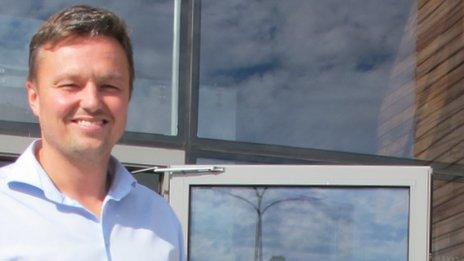
Ecogrupa's Jacek Skoneczny wants Poland to break into new markets
Decisions will have to be made as to whether it is worth preserving some or all of the unsold crop in cold storage.
Ecogrupa's vice president Jacek Skoneczny welcomes the EU aid but says Polish growers might be better served if they were allowed to send the embargoed apples to places like the Middle East or North Africa to help those in need and also promote their products in such new markets.
"We are happy that the farmers can get EU money, but it might be better that, instead of wasting fruit, we could sell it cheaply to the market outside Europe. People would be able to taste our apples and next time they might come back and buy them."
- Published19 August 2014
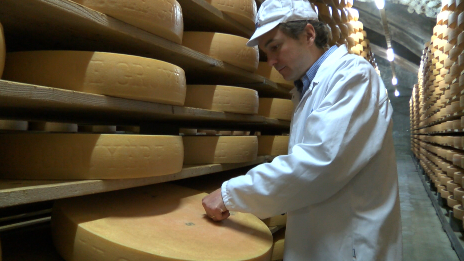
- Published19 August 2014
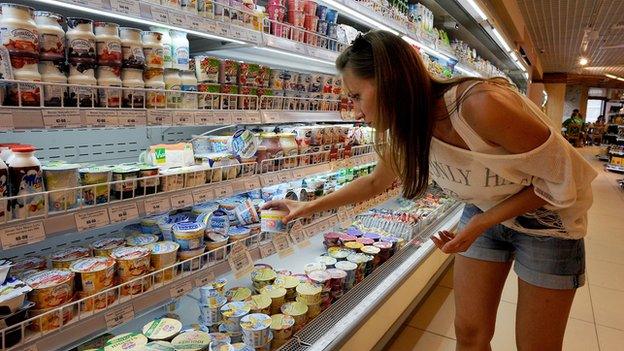
- Published18 August 2014
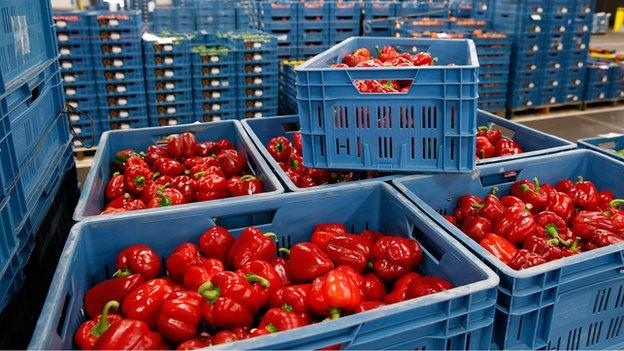
- Published15 August 2014
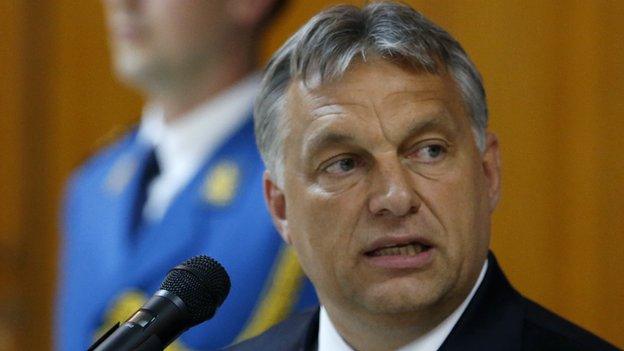
- Published7 August 2014
